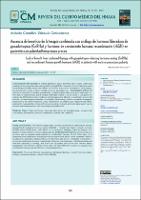Ausencia de beneficio de la terapia combinada con análogo de hormona liberadora de gonadotropina (GnRHa)
Related Resource(s)
http://cmhnaaa.org.pe/ojs/index.php/rcmhnaaa/article/view/907Date
2021-06-09Author(s)
Virú-Loza, Manuel André
Metadata
Show full item recordAlternate title
Lack of benefit from combined therapy with gonadotropin-releasing hormone analog (GnRHa) and recombinant human growth hormone (rhGH) in patients with early or precocious puberty
Abstract
Conclusiones del estudio: El análisis general no indica beneficio de la terapia combinada (análogo de hormona liberadora de gonadotropina [GnRHa] + hormona de crecimiento humana recombinante [rhGH]) versus solo GnRHa, solo rhGH o ausencia de tratamiento. Sin embargo, hay beneficios en mayor o menor medida en ciertas subpoblaciones. Comentario crítico: El artículo es relevante al no haber previamente un meta-análisis sobre la terapia combinada. Por otro lado, es importante ya que la terapia combinada implica el uso de rhGH, el cual puede ser costoso, de difícil adherencia y conllevar a efectos adversos. Además, la conclusión general del artículo – no usar terapia combinada – es aplicable. Sin embargo, falta la evaluación de sesgo de publicación y de reporte selectivo, y hay conclusiones secundarias que requieren una mejor explicación. La presente revisión crítica no encuentra evidencia suficiente para sugerir que la terapia combinada pueda ser efectiva en alguna subpoblación. Study conclusions: The overall analysis does not indicate benefit of combination therapy
(gonadotropin-releasing hormone analog [GnRHa] + recombinant human growth hormone
[rhGH]) versus GnRHa alone, rhGH alone, or no treatment. However, there are benefits to a
greater or lesser extent in certain subpopulations. Critical comment: The article is relevant
as there was no previous meta-analysis on combination therapy. On the other hand, it is
important since combination therapy involves the use of rhGH, which can be expensive, difficult
to adhere to, and lead to adverse effects. Furthermore, the general conclusion of the article -
do not use combination therapy - is applicable. However, the assessment of publication bias and
selective reporting is lacking, and there are secondary conclusions that require better
explanation. The present critical review does not find sufficient evidence to suggest that
combination therapy may be effective in any subpopulation.






